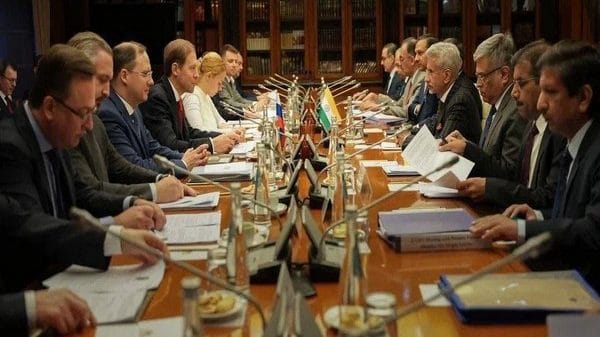New Delhi’s balancing act in international relations is on full display. Indian Foreign Minister S. Jaishankar had a successful meeting with his Russian counterpart Sergey Lavrov in Moscow discussing a wide range of subjects of bilateral, regional and global issues. This is the fifth time the two are meeting after the Ukraine crisis hit the headlines. Continuing Prime Minister Narendra Modi’s message to Putin that “today’s era is not of war”, the Indian foreign minister could have impressed upon his Russian counterpart to work towards resolving the Ukraine crisis through talks and negotiations. If Russia’s withdrawal from the West Bank of the Dnieper River in Ukraine’s Kherson is any indication, there could be some more positive moves of de-escalation of the crisis.
India’s camaraderie with the Cold War adversary of the US-led Western world has certainly raised many eyebrows, thereby increasing the need for India to scale up the balancing act. To begin with, it was not easy for New Delhi to embark on a lonely path of extending an olive branch to Moscow in the wake of its attack on Ukraine when the rest of the democratic world wanted to put Russia in the dog house. India not only refrained from condemning Russia at the behest of the Western world but went ahead and strongly defended its oil purchase despite US-imposed sanctions. While Russian oil imports to India were around 0.2 percent till the first quarter of 2022, they jumped to 22 percent or nearly 9.35 lakh barrels per day by October. This is more than what India buys from Iraq (20.5 percent) or Saudi Arabia (16 percent).
Incidentally, New Delhi is not alone in doing business with Russia, which the US would like to be treated as an outcast. China is not lagging behind in its economic engagement with Moscow. More than 116 multinational giants are reported to be doing brisk business with Russia in spite of US-led sanctions. Many of them are US-based with a strong presence in EU member countries. In early January, even as the US was warning of an impending Russian attack on Ukraine and preparing to retaliate with economic sanctions, about 20 top executives of Italian companies were reported to have held a video call with President Vladimir Putin to discuss ways and means to strengthen economic ties with Russia. The European Union (EU), Russia’s largest trading partner, accounted for 37 percent of Russia’s global trade in 2020, which included about 70 percent of Russian gas exports and half of its oil exports. A number of EU member countries are under pressure from their respective local business houses to get their products exempted from sanctions. If this succeeds, the idea of punishing Russia with sanctions might have to be diluted sooner or later.
Also read: Jaishankar’s ‘balancing act’ with Russia is smart. But US patience will wear thin
World sees the virtue
Yet another fallout of this changing trend in the balancing act is the need to take stock of the emerging new world order. The world is slowly but surely moving towards multilateralism and countries are ready to tweak their foreign policies to suit their economic interests. As a result, dogmatic ideology-based parties in their respective countries may have to give place to pragmatic politics.
In the early sixties and seventies at the thick of the Cold War, India’s relations with the erstwhile Soviet Union were at their zenith. Preceding these friendly ties, then-USSR president Nikita Khrushchev is reported to have famously given (in Bangalore on 26 November 1955) a popular slogan, “Hindi-Rusi Bhai Bhai”, laying the foundations of a new relationship in geopolitics. Much has happened since then including the disintegration of the Soviet Union, the emergence of China as a new contender for global supremacy challenging the US-led world order, and the emergence of the Indo-Pacific as a new region of immense opportunities bringing four major democracies on one platform.
The changing geopolitical dynamics are indications of a few things that would have been difficult to predict only a few years ago. First, it is clear that economic interests are far more important for survival than national interests or ideological grandstanding. Just as corporate entities need money to sustain their lavish lifestyles, countries too need cheaper oil to balance their respective income and expenditure accounts. If stronger power jostling to retain their supremacy refuse to recognise this fact, they will end up losing the support of their allies and friends. They could learn a lesson or two from India. Even as the foreign minister was in Moscow, India’s Foreign Secretary Vinay Mohan Kwatra was holding serious talks with US Deputy Secretary of State Wendy Sherman in Washington.
In the context of the increasing importance of multilateralism, India’s ‘strategic neutrality and autonomy’ in international relations will guide its foreign policy and economic decisions taken in the best national interests. At the same time, New Delhi will have to prepare itself to be a leading player in international groupings like G20 and seriously engage in the endeavours to institutionalise the idea of Indo-Pacific.
The author is the former editor of ‘Organiser’. He tweets @seshadrichari. Views are personal.
(Edited by Prashant)






